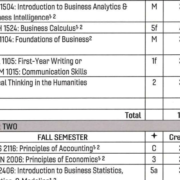How To: Change Majors (And Not End Up Changing Schools)
It’s not uncommon to find yourself in a spot somewhere along your academic journey in college where you have a change of ambitions. Oftentimes, that comes in the form of wanting to change career paths, which starts with changing your major. It may sound like a simple task, and in some cases it is, but oftentimes there’s more to be done than just requesting a switch. From applying to get into restricted majors, to having to see how it affects your graduation date, there are a variety of factors one must consider before committing to a major change.
Having switched my major a total of four times throughout my time in college, I can say from experience that what happens along the way is all determined by how you approach the process. There are definitely a number of ways in which I would do things differently if I had the opportunity to do so, so I’ve put together a short list of the major considerations one must bear in mind should they seek to go about changing their major without a major headache.
Don’t Beat Yourself Up Over It
It’s easy to dwell on, “what could have been” or, “what should have been” but ultimately, doing so will only make the process harder on you. There are a variety of reasons that things play out as they do; don’t put yourself down if you find yourself in a spot where you want to switch your academic major. It may help you in the long run to do so, but it also may not be the more pleasant experience making the effort to switch.
In the first five semesters of my time at Virginia Tech, I had changed my academic majors a total of four times. From Food Science/Spanish to Russian/Spanish to University Studies/Spanish to Real Estate/Spanish, to finally settling down with Public Relations/Spanish, it was not a smooth journey for me. I was pursuing acceptance into the Pamplin College of Business here at Tech, and in doing so, I spent four semesters shaping my schedule and academic planning with that in mind. It’s a long story that is most certainly too much to condense, however, it was a tumultuous time that ended with rejection instead of acceptance, to which I look back on with partial disappointment, but I recognize that things work themselves out for the better, even if the, “better” isn’t staring you in the face right away.
Talk To Your Advisor(s)
Like your career counselor in high school, your academic advisor is your go-to person for all things graduation and scheduling related. Your advisors are the ones that can help you with a plan of action to best approach your collegiate planning, whether it be with the classes you take/when you take them, what could best prepare you for applying to graduate school, or any similar matters, your advisor should be your best academic friend as a college student.
Looking back on how I carried myself in high school versus college, high school-me was much more engaged with my career counselor/advisor than I was with my advisor here in college. In high school I would make sure to check in with my advisor to ensure that I was on track to be ready for post-high school success by getting into the college I wanted to go to (Virginia Tech) and by building a strong resume. In college, I wish I had done the same, but I let, “life” get in the way of doing so. You should see your advisor often, have them know who you are, otherwise you’re gonna end up missing out on a lot of great opportunities for personal development in the form of resume building and collegiate opportunities that could help you land post-undergrad success.
Look At What Is Required To Change, If Any
As mentioned above, oftentimes one may find that switching majors takes more than just telling your advisor that you want to, or checking off a box on an academic registration webpage. For competitive fields of study such as engineering, business, and others, it’s not uncommon for universities to require students to apply for acceptance into select major programs. While that may not be the case for all programs, one should bear in mind that switching can be a difficult and time consuming process depending on what is required when applying.
The summer leading up to the start of my freshman year, I knew that I wanted to transfer to the Pamplin College of Business to study Business Management, but what I didn’t know was that it wasn’t so simple to do so. My advisor informed me that all business major choices at Virginia Tech were restricted, meaning that I would have to spend a number of semesters taking specific courses and holding a strong cumulative and in-major GPA to have a shot at getting in. It’s not a fun route to take, especially when you consider how much time, energy, and money you end up throwing at the endeavor.
Consider Back-Up Options
While being optimistic about switching into the major of your choice is great for helping get the job done, ultimately you want to be realistic with yourself and bear in mind the unfortunate possibility that you may not be able to switch. Whether it be an issue of getting accepted into a restricted major or some other barrier, there is that chance that what you want may be out of reach. Definitely shoot for the stars and push yourself to reach the success you need in order to switch to the major you desire, but consider other options along the way. Take time to look into alternative options that may interest you as well.
After I spent roughly four semesters completing all of the requirements necessary to apply for acceptance into the Pamplin College of Business, I ultimately was denied. I would have had to wait two more semesters to reapply, but at that point I would be ending my junior year. After browsing through all of the major options available at Virginia Tech, as well as reaching out to a number of my peers in various areas of study, I found that Public Relations was a field in which I found both interesting and relatable to my strong suits. It was a backup option that I went with, and have thoroughly enjoyed from the start.
Everyone’s journey to graduation is different, and in knowing that, there’s no real right way to go about doing your undergraduate years, however, there are a variety of ways in which you can make the experience less difficult on yourself by avoiding common pitfalls such as what was mentioned above. Take each, “mistake” as a learning experience, and be open to change if it’s needed.



